Ever thought of letting an AI system manage your customer relationships?
Tracking sales, services and customer interactions is not an easy task in a job. Businesses need to find new ways to learn, retain and engage customers. That's where AI-CRM comes into play. AI-CRM automates tasks, tracks customer data, eases customer worries and organizes their information. In short, artificial intelligence (AI) in Customer Relationship Management is transforming the relationship between business and customers by tracking, monitoring and automating real-time interactions.
Let us first understand the basics of AI CRM tools and how they can change the game for customer relationship management.
What Are AI CRM Tools?
Customer Relationship Management (CRM) software is a rising AI technology for sales and marketing. It tracks leads, streamline customer communications and keep records of customer data. With CRM, tracking and organizing all aspects of sales, while enhancing user experience and minimizing manual tasks has become easier. It categorizes potential leads by contact and transaction history, improving customer services. It helps strengthen the relationship between client and business, builds trust and loyalty. This helps in retaining old customers, while obtaining new ones. It also helps you stay competitive in the industry.
How AI Streamlines CRM?
Every business has its own goals, target customers, unique requirements and workflow structure. As marketing and customer expectations evolve, smart relationships and business management become even more critical.
AI is a transformative technology that allows machines to carry out manual and repetitive tasks. It provides numerous capabilities: drafting emails & personalized conversation, giving recommendations, identifying patterns, predictive analysis, making data-driven decisions and everything in between.
When AI is embedded into CRM, it becomes an AI-enabled CRM tool. It automates and enhances the customer relationship management system. It is quicker, smarter and better.
Read Also: Is Slate CRM a Best Choice for Educational Institutions in 2026?
Top 8 AI CRM Tools You Can Adopt in 2026
Both sales & marketing teams prefer specialized CRM tools. Let's explore a broader use of AI CRM tools, their advantages and uses:
1. OutRightCRM: It is meant to enhance customer experience and relationships management to centralize and automate all business operations with the help of cloud optimization. It offers a wide range of benefits that can rival the most sophisticated CRMs in the market. It has all the basic functionalities expected from AI CRM tool and is best suited for small and medium-sized businesses. Few highlighted features are:
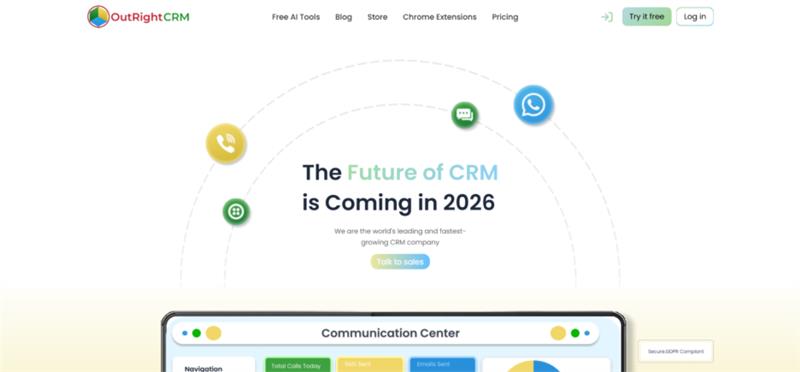
- AI-powered automation.
- Contacts and Accounts Management.
- DocuSign Integration.
- Universal API integration.
- Email Archiver.
- Omni-channel Communication.
- Automatic Dialer.
- Streamlined Sales Pipeline.
- Fully customizable.
- Cloud-based scalability.
- Email extraction & marketing.
- Custom video meetings.
- Sales automation.
2. GuestPostCRM: It automates your Guest Post and SEO workflows from start to finish. GuestPostCRM is a goal-oriented AI-based platform that ensures smooth and efficient workflow. Its key features include:
- Automated order & task management.
- Link tracking and management.
- Personalized AI-generated responses.
- AI Summary.
- Client details & history at your fingertips.
- SEO Summary.
- Blacklist Status.
- Automates repetitive and manual admin tasks.
- Predefined order templates.
- Custom deals.
- Customizable workflows.
- Transparent financial management (integrated invoice generation).
- Secure Data Storage.
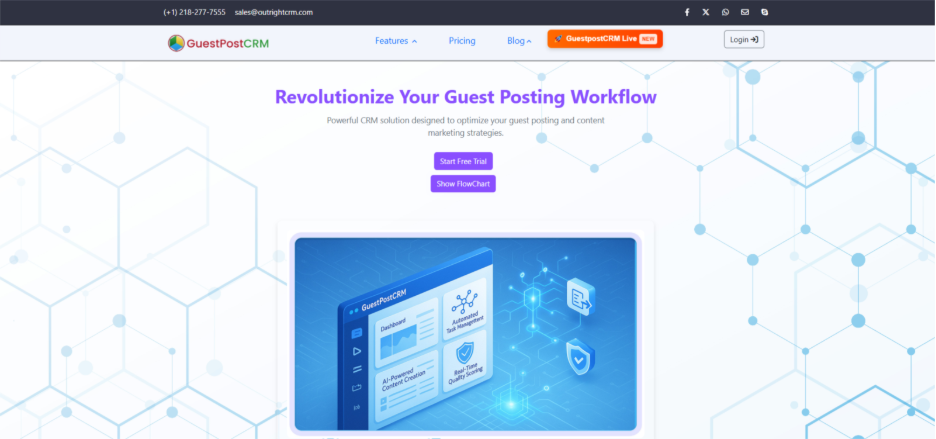
3. HubSpot: A conversational and interface AI tool, designed to aid businesses of all sizes manage their contacts and customer relationships more effectively. Its main features are:
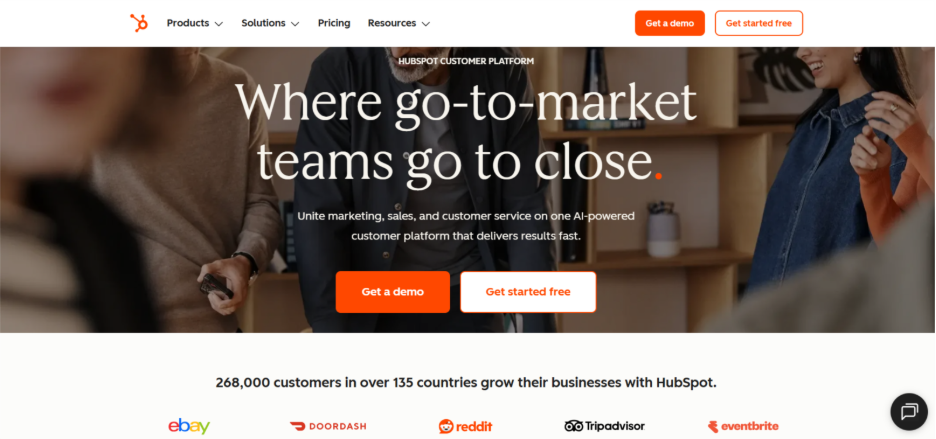
- Generating Content (blogs, emails, posts).
- Customer data management.
- Customized prompts and responses.
- Sales insights & recommendations.
- Offers free email marketing benefits.
- Records, activities, & company performance summarization.
4. Zoho CRM: It is a user-friendly AI-enabled platform, featured to handle sales and customer support activities. It offers a complete view of customer interactions from lead generation to deal closure. Some distinctive features include:

- Advanced lead management & conversion.
- Customer engagement & scale operations.
- Multi-channel communication
- Custom integrated solutions.
- Streamlines sales process.
- Outstanding customer support.
- Actionable dashboards & reports.
- Third-party integration, facilitating cooperation & data synchronization.
5. Pipedrive: A cloud-based platform programmed to aid sales processes. It automates tasks, streamline sales, and improves workflow efficiency while handling deals. This boost efficiency and customer-business relationship. Main features are:
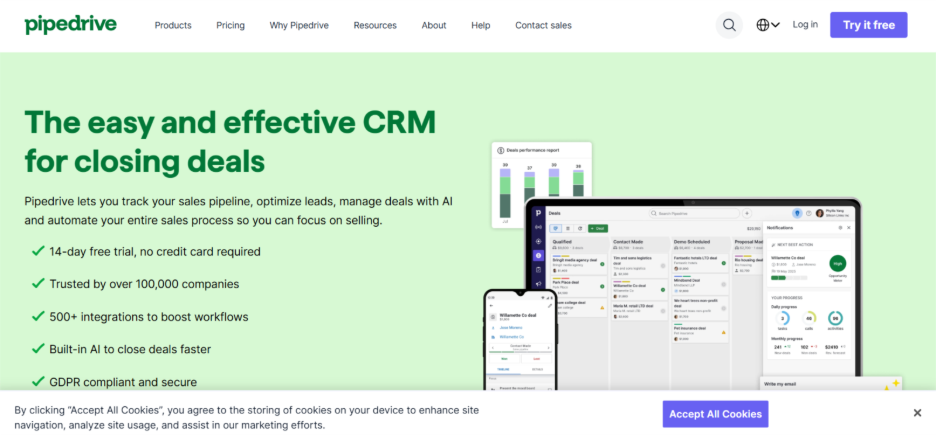
- Reporting and Sales management.
- Generates real-time insights.
- Contact management.
- Integrated emailing & communication enhancement.
6. Freshsales: An AI-powered CRM that allows sales teams to effectively manage & organize sales, quickly close deals, personalize customer responses, enhance sales conversion and boost productivity. It is intuitive and easy to use. Key features include:
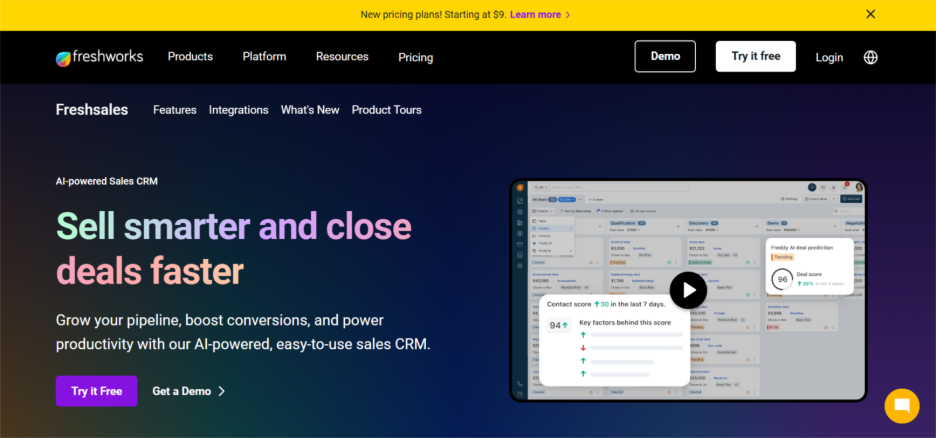
- Email marketing.
- Campaign management.
- Managment of leads.
- Portal for customer support.
- Product & price regulation.
- Contact & account management.
7. Zendesk Sell: A versatile, fast and open CRM platform built for businesses to improve customer relationships. It offers a centralized platform to manage customer contacts, account information, and sales leads. Its main benefits are:

- Customizable interface.
- Wide range of API integrations.
- Sales management.
- Pipeline visibility.
- Valuable insights recommendation.
- Data analysis & team management.
8. ClickUp: It offers a dynamic CRM benefit well-suited for small businesses. It manages and customizes how tasks & data are shown. It keeps records of all completed, pending and overlooked tasks. It Tracks progress at every step to manage project and enhance efficient workflow. Some key features are:
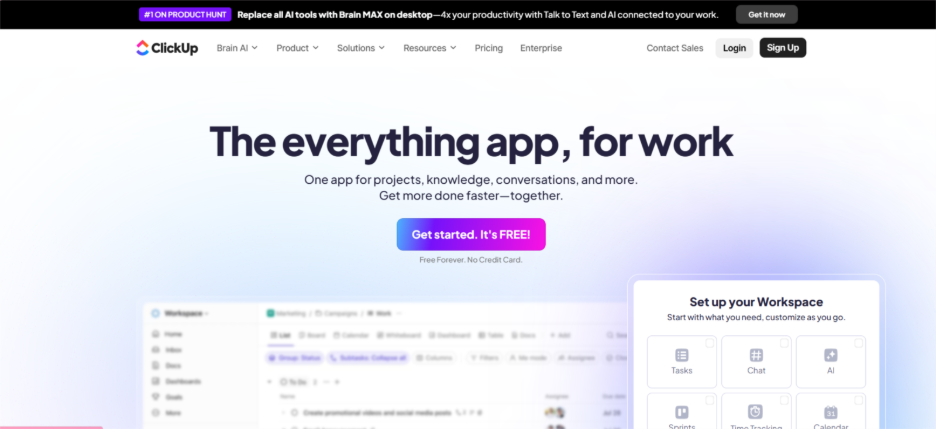
- Customizable reports.
- Task tracking.
- Team collaboration.
- Project management.
- Track & organize client interactions.
What Are the Key Features of AI CRM Tools You Must Know?
Want to make the best use of AI? Then carefully choose tools that are integrated into your CRM system to improve marketing, sales and customer relationships. To know which tools would be most effective for your business, these key features you need to look out for:
- Predictive Analysis: It is one of the top elements of AI for CRM. CRM solutions powered by AI have elevated the capabilities to analyze data by looking at historical data as well as customer behavior. These two components provide organizations with insights for analytics forecasting, reporting, & defining target audience.
- Sentiment Analysis: AI can recognize the emotions of the customer from chats, emails, product feedback, and help teams determine how they could approach appropriately in these situations and impact customer satisfaction positively.
- Lead Data Collection: Through AI-powered lead scoring, teams can gain insights by prioritizing lead data and determine the likelihood to convert them. Demographics and behaviors are two factors that give insights into potential leads and allow sales teams to identify them. Additionally, AI can also segment leads and handle campaign management for the team.
- AI Customer Support Tool: Chatbots and virtual assistants powered by AI can offer instant personalized responses to customer queries and questions, minimizing delays and burden on team staff.
- Natural Language Processing: AI must be able to answer questions in a manner that it is simple to absorb & understand.
- Reporting & Data Management: AI can process large amounts of data, including complex enterprises and unstructured data coming from multiple communication channels. AI in CRM applications can leverage tools such as ML and NLP to organize and sort data in a sensible way.
What Are the Business Use Cases of AI CRM Tools?
1. Sales forecasting: For better planning and resource allocation, AI generates accurate revenue predictions and optimizes sales pipelines.
How it works:
- Research historical data, current pipeline, and analyze market trends.
- Deal closure probability prediction and estimating time.
- Identifies at-risk deals and recommend strategies.
- Provides confidence levels for different forecast scenarios.
2. Customer Satisfaction: Identify possible problems and solve them before customers even need to complain.
How it works:
- Monitoring both product usage and error histories.
- Detects abnormal behavior alerting against the risks.
- Creates support tickets automatically for at-risk customers.
- Engages in proactive outreach with resolutions.
- Forwards critical issues to head of support.
3. Cross-Selling & Upselling Optimization: AI can find opportunities for revenue growth of your existing customers by recommending other items or upgrades.
How it works:
- Understand customer's product usage and relevant purchase history.
- Recommends relevant products or premium upgrades.
- Knows when to request upsell/upgrade.
- Calculates customer willingness to pay and price sensitivity.
4. 24/7 Automated Customer Support: AI-driven chatbots can provide, accurate and immediate responses to customer queries 24/7 without human interaction.
How it works:
- Addresses common inquiries using AI and NLP.
- Transfer complicated inquiries to human agents.
- Keeps track of course of conversation during transfer.
- Learn from past conversations to improve over time.
5. Customer Churn Prevention: AI searches for customers that are at risk of churning before they do, so the opportunity for retention can be acted on.
How it works:
- Looks at usage, engagement patterns, and support interactions.
- Calculates and assigns churn risk scores to each customer.
- Initiates automated campaigns for at-risk accounts.
- Informs customer success teams for high-value customers.
6. Workflow & Task Automation: AI minimizes human effort for sales and support teams, saving time. It also ensures that no request or follow-up lead is missed or overlooked.
How it works:
- Routine tasks like data entry, call logging, and follow-ups are automated.
- Setting up reminders for meetings and deadlines.
- Minimizes human error and saves time.
Conclusion
Artificial Intelligence in Customer Relationship Management is creatin a buzz in the industry. It has become an incredibly necessary tool, taking customer relationship management to the next level.
AI performs tasks that are difficult and time-consuming for humans; from sales automation to lead generation, while tracking every step of the process. AI CRM provides support in taking data-driven decisions, gives personalized recommendations, articulating insights, enhancing customer services, understanding trends and maintain transparency. AI CRM has it all. So, if you’re searching for an all-in-one solution to any business problems, then AI CRM is your game-changer.


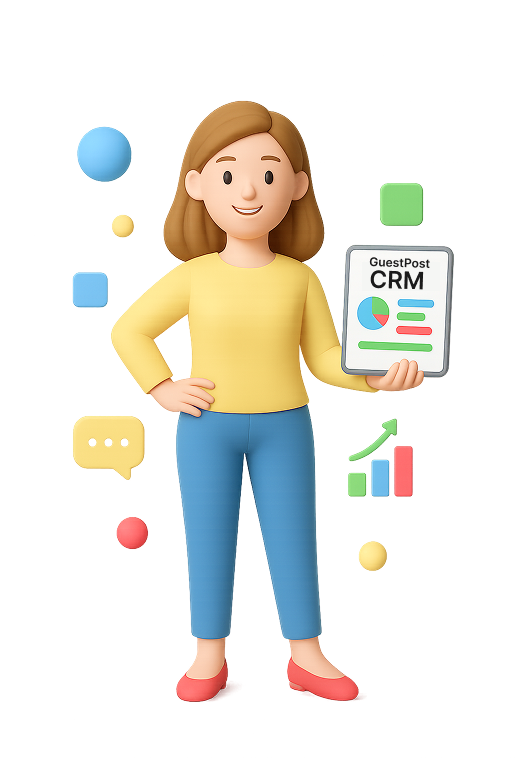


.png)
.png)


.png)